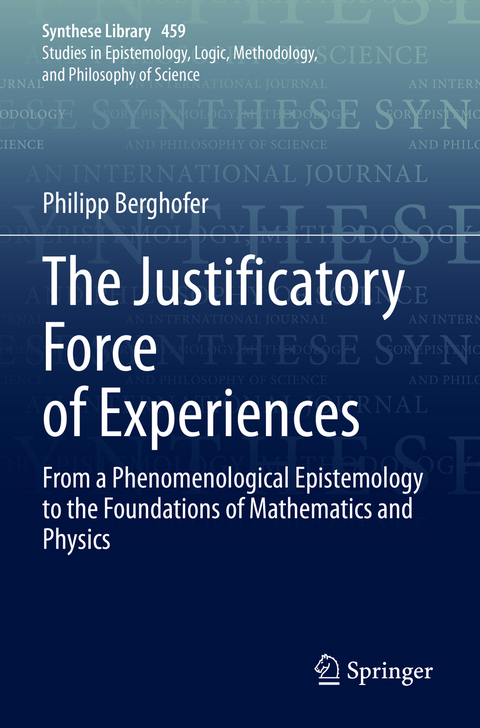
The Justificatory Force of Experiences
Springer International Publishing (Verlag)
978-3-030-96115-2 (ISBN)
The book is unique as it utilizes methods and insights from the phenomenological tradition in order to make progress in current analytic epistemology. It serves as a starting point for re-evaluating the relevance of Husserlian phenomenology to current analytic epistemology and making an important step towards paving the way for future mutually beneficial discussions. This isachieved by exemplifying how current debates can benefit from ideas, insights, and methods we find in the phenomenological tradition.
lt;b>Dr. Philip Berghofer is a Post-Doc researcher and lecturer at the Philosophy Department of the University of Graz, Austria. His research focus centers around epistemology, phenomenology, philosophy of physics, and philosophy of mathematics. His current position is funded by the research project "Intentionality and Symbolic Construction: The Phenomenological Background of Hermann Weyl's Philosophy of Physics" granted by the Austrian Science Fund. Prior to this, he was a recipient of a DOC-Fellowship of the Austrian Academy of Sciences.
Dr. Berghofer is the designated president of the Austrian Society of Phenomenology, designated Book Review Editor of Husserl Studies (Springer), and the co-editor of the volume Phenomenological Approaches to Physics (Synthese Library, 2020).
Introduction.- Part I. A Phenomenological Conception of Experiential Justification. 1. Motivating PCEJ.- 2. Perceptual Justification.- 3. Intuitional Justification.- 4. How to Supplement Mentalist Evidentialism: Phenomenological Principles are the Fundamental Epistemological Principles!.- Part II. Husserl as a Proponent of PCEJ.- 5. Husserl as a Moderate Foundationalist.- 6. The Nature and Systematic Role of Evidence: Husserl as a Proponent of Mentalist Evidentialism.- 7. Husserl's Conception of Experiential Justification.- 8. Husserl's Universal Empiricism as a Moderate Rationalism.- 9. Husserl's Phenomenological Intuitionism.- Part III. Transcendental Phenomenology as the Ultimate Science. 10. Transcendental Phenomenology as an Epistemological Project.- 11. New Ways to Transcendental Phenomenology.- 12. Transcendental Phenomenology as the Project of Ultimate Elucidation.- Part IV. The Phenomenological Foundations of the Individual Sciences. 13. Sources of Knowledge: The Correlational A Priori.- 14. The Phenomenological Foundations of Mathematics: Introducing a Phenomenological Intuitionism.- 15. Phenomenological Approaches to Physics.- Conclusion.- Index.
| Erscheinungsdatum | 28.03.2023 |
|---|---|
| Reihe/Serie | Synthese Library |
| Zusatzinfo | XXI, 371 p. 1 illus. |
| Verlagsort | Cham |
| Sprache | englisch |
| Maße | 155 x 235 mm |
| Gewicht | 605 g |
| Themenwelt | Geisteswissenschaften ► Philosophie ► Allgemeines / Lexika |
| Geisteswissenschaften ► Philosophie ► Erkenntnistheorie / Wissenschaftstheorie | |
| Geisteswissenschaften ► Philosophie ► Philosophie der Neuzeit | |
| Naturwissenschaften | |
| Schlagworte | experiential justification • Husserl as a Proponent of PCEJ • Intuitional Justification • Mentalist Evidentialism • PCEJ • Perceptual Justification • Phenomenological Conception of Experiential Justification • Philosophy of Physics • Transcendental Phenomenology |
| ISBN-10 | 3-030-96115-X / 303096115X |
| ISBN-13 | 978-3-030-96115-2 / 9783030961152 |
| Zustand | Neuware |
| Haben Sie eine Frage zum Produkt? |
aus dem Bereich


